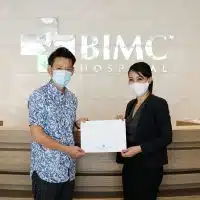The Indonesian Health Ministry is getting tough on unreported and unidentified tuberculosis (TB) cases, the country suffering from the second-highest number of unreported cases in the world. The latest global TB report by the World Health Organization (WHO), states as many as 690,000 TB cases in Indonesia may not be detected or reported. Such unreported and undetected cases could result in more than 100,000 deaths.
BIMC Hospitals wishes to do its part by ensuring residents and visitors to Bali understand that chronic cough persisting for eight weeks or longer in adults or, four weeks in children, requires medical attention. There are several major causes of chronic cough:
- Postnasal drip produces mucus that can trickle down the back of your throat and trigger a cough reflex.
- Gastro esophageal reflux disease (GERD) is a common condition in which stomach acid flows back into your esophagus.
- Some blood pressure drugs are known to cause chronic cough in some people.
- Chronic bronchitis is long-standing inflammation of your major airways and can cause congestion, breathlessness, wheezing and a cough that brings up discolored sputum.
- Tuberculosis (TB), a serious lung infection often apparent in developing countries.
Signs and symptoms of TB may include:
- Coughing that lasts three or more weeks
- Coughing up blood or sputum
- Chest pain or pain during breathing or coughing
There are various examinations to diagnose TB but doctors typically would combine examining sputum and imaging, namely chest x-rays or computer tomography (CT) scans are used to evaluate chronic cough.
Antibiotics must be taken for at least six to nine months. The exact drugs and length of treatment depends on age, overall health and possible drug resistance. Lung TB can be cured if you take the prescribed medication regularly.
In countries where tuberculosis is common, infants are often vaccinated as the disease can be prevented in children though for now, not effective in adults.












